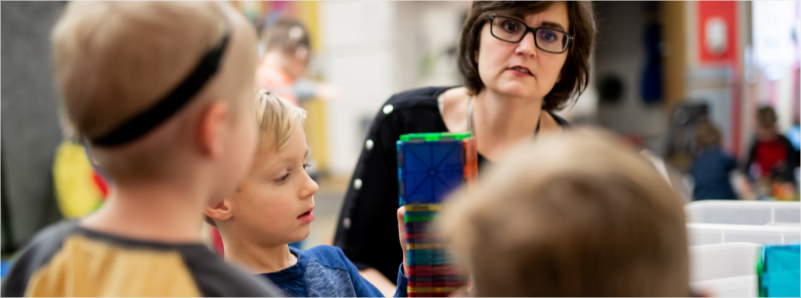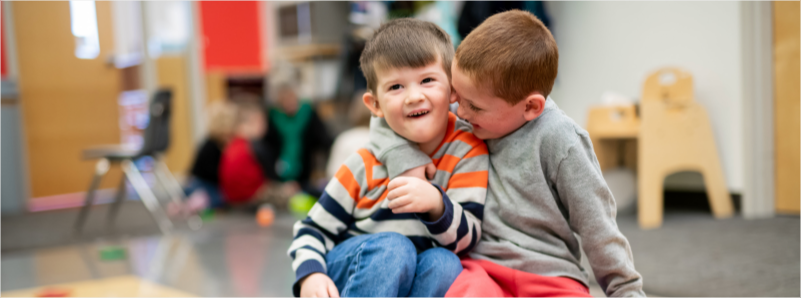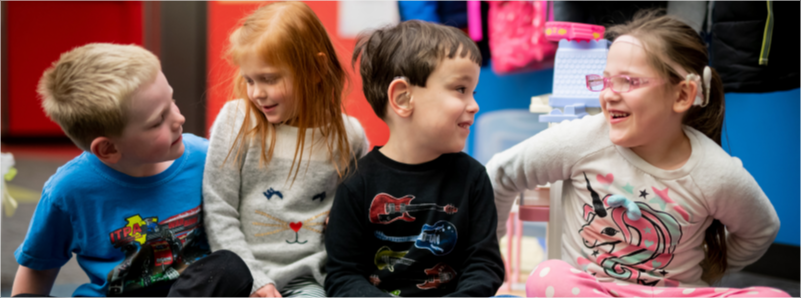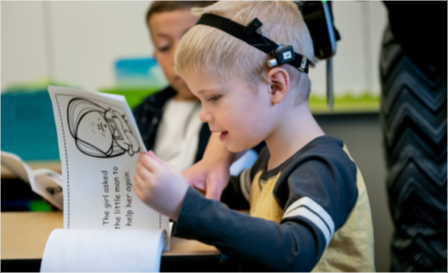Components of the Daily Routine
Circle Time/Calendar
Participation in this daily routine helps children develop counting and time concepts, discuss past and future events and incorporate music into their daily lives. Children develop the ability to use targeted language structures easily and, when their use becomes automatic, children are better able to generalize communication skills to other environments.
Journals
Journals serve as a communication tool between home and school and allow even the youngest child to share information between these two important parts of their world. Teachers help each child select something from the school day to draw/write about and journals go home daily to provide a forum for kids to share what they learned at school that day. Families are asked to create a journal entry each evening, prompting kids to share stories from home with their peers.
Recess/Movement/Gross Motor
Children learn through play which ignites imaginations and helps bodies to develop. Carle Auditory Oral School provides daily opportunities for children to engage in unstructured learning and play during recess. Tricycles, swings, climbers and slides, in addition to opportunities for running and ball play encourage gross motor development outdoors. Indoors, door-mounted swings, scooters, jump ropes, a mini-trampoline and hula hoops ensure that children have opportunities to move year-round.
Snack
Snack provides a wonderful opportunity to practice manners, self-help and social communication skills in a small-group setting. Often discussions begun during snack will spark future learning opportunities in the classroom; snack time is sometimes used as an additional opportunity to read aloud to the children.
Daily Read-Alouds
Research shows that literacy rich experiences, such as read-alouds, correlate positively to future academic success. At CAOS, stories come to life with props and dramatic voices to support children in developing a life-long love of reading. Our method provides each child with opportunities to answer questions, make predictions, assume the role of a character or take a turn at retelling stories. Often, classroom teachers alter story book text to provide additional practice with targeted language forms for children with hearing loss. By listening to stories over time, children are bombarded with examples of targeted language structures and incorporate those structures when they retell and act out the stories.

Nap
Parents of preschool age children can request their child participate in a daily nap time. Exact times and duration of nap time vary from year to year based on our students’ needs.
Pre-Academics
Reading, math, science and health concepts begin to develop long before kindergarten. Children learn developmentally appropriate phonological awareness skills, experiment with quantity concepts, explore the relationships between objects in their worlds and use print meaningfully throughout each day. These experiences lay the foundation for academic skill development in later years.
Centers
CAOS embarks on learning adventures during their theme-based units of study and our Discovery Center brings it all to life. Early childhood classes (three- and four-year-olds) play the theme in our dramatic play, block, computer, writing, art, motor and manipulatives centers.
Sensory Breaks
Young children function better with opportunities to get their wiggles out through dance, exercise and play, in addition to opportunities to attend to stories and engage in fine motor activities. Sensory breaks provide these opportunities and it’s not uncommon to see groups of children transitioning from one activity to the next in a crab walk, or taking a break from an art activity to do jumping jacks.

Clean up and Dismissal
Children learn valuable organization skills and develop a sense of pride in their accomplishments when they participate in getting their classrooms ready for learning the following day. Dismissal provides an opportunity for parents and teachers to interact informally at the end of each school day and helps maintain the home-school collaboration so important to each child’s success.
Music
CDs, musical instruments, sing-a-longs and homemade music makers are incorporated throughout the day to assist children with transitions and skill acquisition in addition to developing an ear and appreciation for a variety of music forms.
Daily Individual Therapy
The type and amount of therapy each child receives is based on their individual communication profile. Most children participate in 60 minutes per day of one-on-one therapy with a certified speech language pathologist or aural rehabilitation audiologist. Theme-based units of study are incorporated into the sessions.
To help prevent gaps in knowledge, children who are deaf and hard of hearing participate in therapy at the same time. Teaching stops, children who are deaf and hard of hearing go to therapy, children with typical hearing go to enrichment. This also helps with forming a solid class culture, as all children engage in learning activities together.
Daily speech sessions are documented so families can support communication-skill development in a meaningful way. Parents and staff partner to address the majority of speech, language and listening targets, using speech journals and bi-weekly updates on all targets to help the team stay on the same page.
Enrichment
Preschool, Pre-K and Primary children with typical hearing participate in daily 60-minute sessions with our Enrichment teachers to address specific needs and expand their experiences. For many children with typical hearing CAOS is their first exposure to a structured learning environment and they may need additional support to develop fine motor, academic, or social skills. Enrichment sessions can also include additional read-alouds, exploration of technology including laptops and SmartBoards, cooking activities, exposure to foreign languages, yoga and a variety of art media.

Specials
Children in Pre-K and Primary classes participate in specials each week. Children enjoy Physical Education, Music, Art, Library and Friendship Circle each week. As with other parts of the school day, specials provide additional opportunities for children to hear and practice targeted language structures across environments. Holding children accountable for their targets across the school day helps them internalize communication skills more readily and increases their rate of progress.
Academics
Carle Auditory Oral School staff combine commercial curricula with teacher-made activities and learning opportunities to ensure each child receives the support and learning experiences they need to expand their skills. Small-group, individualized instruction helps prepare students for a successful transition into their neighborhood schools. Examples of curricula used at CAOS include:
SHARE INFORMATION ABOUT YOUR CHILD



